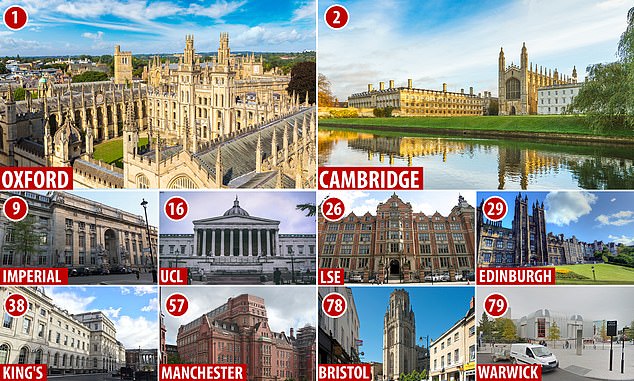Introduction:
When it comes to pursuing higher education, the United Kingdom is renowned for its world-class universities and rich academic traditions. With a diverse range of institutions, each possessing unique strengths and specialties, students from all corners of the globe flock to the UK in pursuit of academic excellence. In this blog post, we’ll explore some of the top universities in the UK, highlighting their key features, rankings, and contributions to the global academic landscape.
Founded in the 12th century, the University of Oxford stands as one of the oldest and most prestigious universities worldwide. Known for its rigorous academic programs and esteemed faculty, Oxford consistently ranks among the top universities globally. Offering a wide range of disciplines, the university’s tutorial system fosters critical thinking and personalized learning experiences, making it an attractive choice for ambitious students.
Often mentioned in the same breath as Oxford, the University of Cambridge is another world-renowned institution with a long history of academic excellence. With an emphasis on research and innovation, Cambridge has produced numerous Nobel laureates and influential thinkers. The university’s collegiate system nurtures a strong sense of community and provides a supportive environment for intellectual growth.
Focusing primarily on science, engineering, medicine, and business, Imperial College London is a leading institution in technological advancements and research breakthroughs. It is highly regarded for its hands-on approach to learning, strong industry ties, and state-of-the-art facilities, which attract students passionate about making a real-world impact.
Specializing in social sciences, economics, politics, and related fields, LSE is a global leader in social science education and research. Known for its influential faculty, international student body, and vibrant campus life, LSE equips students with the skills to address complex societal challenges.
Located in the historic city of Edinburgh, this Scottish university is renowned for its excellence in the humanities, social sciences, and sciences. With a strong focus on research, the University of Edinburgh has made significant contributions to various academic fields and continues to attract students seeking a high-quality education.
As a member of the prestigious Russell Group, the University of Manchester is one of the UK’s most respected research institutions. Boasting an impressive array of programs across various disciplines, it attracts a diverse student body and is committed to fostering an inclusive and supportive learning environment.
Located in the heart of England, the University of Warwick is a dynamic and forward-thinking institution with a strong emphasis on interdisciplinary research and innovation. Its commitment to internationalization and industry partnerships ensures that graduates are well-prepared for the global job market.
A leading multidisciplinary university, King’s College London excels in areas such as law, health sciences, humanities, and social sciences. With its central London location and strong connections to various industries, King’s offers students unique opportunities for networking and career advancement.
Conclusion:
Choosing the right university is a crucial decision that can significantly impact a student’s future. The UK’s top universities, with their academic heritage, cutting-edge research, and diverse student communities, present unparalleled opportunities for personal growth and academic excellence. Whether you’re interested in the sciences, humanities, social sciences, or business, the UK’s top universities are well-equipped to nurture your talents and help you achieve your academic and career aspirations.
Applying to universities in the UK can be an exciting yet intricate process. Here’s a step-by-step guide to help you navigate the application process effectively:
- Research and Shortlist Universities: Start by researching different universities and their courses to find the ones that align with your academic interests and career goals. Consider factors such as course content, reputation, location, facilities, and available scholarships.
- Check Admission Requirements: Review the specific admission requirements for each university and course you are interested in. Requirements may include academic qualifications, English language proficiency tests (e.g., IELTS or TOEFL), recommendation letters, personal statements, and portfolios (for certain creative courses).
- Register with UCAS: Most undergraduate applications are made through the Universities and Colleges Admissions Service (UCAS). Create an account on the UCAS website and complete the necessary sections, including personal information, education history, and course choices.
- Prepare Supporting Documents: Gather all the required documents, such as academic transcripts, certificates, reference letters, and your personal statement. Ensure that your documents are in English or officially translated.
- Write a Personal Statement: Your personal statement is a crucial part of the application, especially for undergraduate courses. It should highlight your academic achievements, extracurricular activities, relevant skills, and reasons for choosing the course and university.
- Submit the Application: Complete your UCAS application, including the course choices and personal statement. Proofread your application thoroughly before submission.
- Pay Application Fees: Pay the required application fees. Some universities may charge an application fee, so be prepared for this cost.
- Track Your Application: After submitting your UCAS application, you can track its progress through the UCAS Track service. You may receive offers from universities or be invited for interviews or additional assessments.
- Consider Student Visa Requirements: If you are an international student outside of the EU/EEA, you will likely need a Tier 4 student visa to study in the UK. Check the UK government’s official website for visa requirements and apply for the visa once you have received a Confirmation of Acceptance for Studies (CAS) from your chosen university.
- Apply for Accommodation (if necessary): Once you have received an offer and accepted it, consider applying for on-campus or off-campus accommodation, depending on your preferences.
- Accept Offers and Make a Decision: After receiving offers from universities, carefully evaluate them based on your preferences, course content, and any scholarship opportunities. Accept the offer that aligns best with your goals.
- Prepare for Departure: Make travel arrangements, arrange accommodation, and ensure you have all the necessary documents (passport, visa, CAS, etc.) before leaving for the UK.
Remember, each university may have slightly different application processes, so always refer to the official websites of the universities you are applying to for the most accurate and up-to-date information. Good luck with your applications and academic journey in the UK!
Requirements for international students applying to study in the UK can vary depending on the level of study (undergraduate, postgraduate, or research), the specific university, and the chosen course. However, some common requirements for international students include:
- Academic Qualifications: International students should have completed their previous education with qualifications equivalent to the UK education system. For undergraduate studies, this typically includes a high school diploma or its equivalent. For postgraduate studies, a relevant bachelor’s degree or equivalent is usually required.
- English Language Proficiency: Since English is the primary language of instruction in most UK universities, international students whose native language is not English must demonstrate English language proficiency through standardized tests like IELTS (International English Language Testing System) or TOEFL (Test of English as a Foreign Language).
- Specific Course Requirements: Some courses may have additional subject-specific requirements or prerequisites. For example, certain science or engineering programs may require a background in specific subjects.
- References or Recommendation Letters: Universities often ask for letters of recommendation from teachers, professors, or employers to assess an applicant’s academic and personal qualities.
- Personal Statement: A well-written personal statement is a crucial part of the application process, especially for undergraduate courses. It should showcase the student’s motivations, goals, and suitability for the chosen course.
- Portfolio (for Creative Courses): Applicants to creative programs such as art, design, or performing arts may be asked to provide a portfolio showcasing their creative work.
- Visa Requirements: International students from outside the European Union (EU) and European Economic Area (EEA) will need to apply for a Tier 4 student visa to study in the UK. This requires a Confirmation of Acceptance for Studies (CAS) from the university and sufficient funds to cover tuition fees and living expenses.
- Financial Documentation: International students must demonstrate that they have enough financial resources to cover their tuition fees and living expenses while studying in the UK. This is an essential part of the visa application process.
- Health and Medical Insurance: Students may need to provide proof of health and medical insurance coverage during their time in the UK.
It’s essential to check the specific requirements of each university and course you’re interested in applying to, as these may differ from one institution to another. Additionally, be mindful of application deadlines, as they can vary depending on the level of study and the university. Starting the application process well in advance and being thorough in preparing your documents will increase your chances of a successful application to study in the UK.




Leave your comment